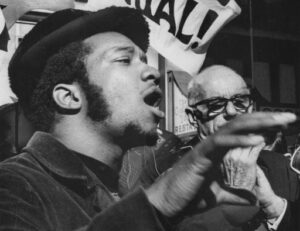Earlier this week, we received the terrible news that Pete Gillard, a long-standing comrade, passed away on April 21. It appears that Covid-19 ultimately cost him his life—after he fought and survived cancer surgery, sepsis, other health problems after weeks in intensive care.
Revolutionary Socialism in the 21st Century (rs21), the organization that Pete helped form, has set up a page for Pete’s many comrades and friends to share memories, photos and tributes, as so many of us mourn his death.
Below, we present a tribute to Pete’s many contributions to the revolutionary socialist movement—including his key role in building the ISO—by Sharon Smith.
Pete Gillard arrived in the U.S. in 1984, already a long-standing member of the International Socialists (IS) and then the Socialist Workers Party (SWP) in England. He showed up to an International Socialist Organization (ISO) national event, sporting a New York Yankees baseball cap and a bright blue jacket—with the broad smile and twinkling eyes that became familiar to all of us in the following years. Pete can be remembered as cheerfully carrying a pint of beer around many social and political gatherings, eager to take up a debate or share his wry sense of humor on any given topic.
Pete enthusiastically embraced his new life in New York City, and dedicated himself to the then-tiny ISO branch there—playing a key role in its success, especially after 1990 when the organization began to grow substantially. But Pete never viewed his role as limited to convincing young people to join; he followed up personally with each and every one of them, offering to share and discuss books and articles aimed at training them as Marxists. He was well known for engaging younger members politically, and many have been sharing on social media their personal memories of his generosity and patience—gently nudging them toward the revolutionary socialist tradition without disparaging them when they disagreed.
I asked Lance Selfa to describe Pete’s impact on him years ago, when Lance was a new ISO member. This is what he shared, which I believe captures Pete’s character perfectly:
I met Pete the first time when I traveled to Britain in 1984 to attend the Marxism conference. I was 24 and a new member of the socialist movement. And it was in the midst of the great miners’ strike. I don’t recall how I met Pete (probably after a meeting), but he did seem to go out of his way to take me and other 20-something ISO members under his wing for the few days we were in London for the conference. He took us to his apartment and gave us some old journals and pamphlets that helped to form some of our foundation in the International Socialist tradition.
Of course, Pete also liked to have a good time. One night, he took us to a bar where the band was playing traditional Irish music. At one point in the evening, after we’d had a pint of bitters or two, the band launched into an impassioned rendition of the ballad “James Connolly”. When they finished, and while the crowd applauded, the lead singer said that he’d dedicated the song to “the American socialists in the back.” The rest of the patrons turned around to look at us, who were probably all blushing, and raised their glasses to us. I heard one person say, “I didn’t even know there were socialists in America.” Remember, this was the height of the Reagan era! How did the band know we were there? Pete’s impish grin gave it away.
In some ways, Pete was a “troublemaker” who was never afraid to speak his mind or criticize the political positions that so many of us took for granted—and he made a few political enemies along the way in decades past. Should we blame him for that? I don’t think so. Pete never shied away from political disagreements, almost to a fault, but he wasn’t one to hold a personal grudge.
After some very heated debates when Pete was an ISO member, Ahmed Shawki and he nevertheless reconnected many times in the last decade or two. Neither of them harbored lasting resentment, preferring to focus on their shared commitment to the revolutionary socialist project. This is something that those in the revolutionary socialist movement historically were able to take for granted—but that lesson is long lost in today’s social-media-driven, judgmental, left political culture in which condemnation against other comrades prevails. That alone is a tragedy that has greatly contributed to the decline of the revolutionary left in recent years.
The last time I saw Pete in person was at a Historical Materialism conference in London. We all gathered with other comrades at the bar every evening, talking politics and reminiscing about the past—laughing uncontrollably about our bygone political differences as we sat around the table, clanking beer mugs. That is true comradeship.
I was never lucky enough to meet Gill George, Pete’s longtime partner, but he talked about her all the time. He both adored and admired her for (among many other reasons) her intelligence, her principles and her role in leading the class struggle on the ground. Pete never practiced an abstract “revolutionary politics” but was at any given time very active in building movements throughout his life—from the struggle against the war in Vietnam in the 1960s and 1970s to campaigning against AIDS in the 1980s to trade union struggle in more recent decades. Pete and Gill dedicated themselves to campaigning against cuts to the National Health Service, which he described as a fulltime “job,” after retirement.
Perhaps most importantly, Pete dedicated his life to the politics of revolutionary socialism—and never wavered from those politics even as so many others have moved away from them, discouraged by their own difficult experiences over the last four decades. Pete contacted me well over a year ago, when he became aware of the deep schism forming within the ISO, to express political support for our stance in opposing support for candidates—including Bernie Sanders—running for office on the Democratic Party ticket, because he understood that the Democratic Party is a ruling-class political party that can never champion the interests of the working class. We knew then, and it has been proven since, that the Democratic Party establishment would never allow Sanders to succeed.
Pete, Ahmed and I remained in contact through email and Skype for many months after the ISO voted to dissolve itself. As such, he played a role strengthening our comrades’ resolve to form the International Socialism Project (ISP) to keep those politics alive.
Pete also understood that the politics of revolutionary socialism requires explicitlyrevolutionary socialist organization, and he never gave up on that project even in the face of the crisis of revolutionary organizations the world over in the recent years. After the British SWP disaster that exposed a rape coverup on the part of its leadership, Pete helped to found rs21 to carry on the revolutionary socialist tradition.
Ahmed, Pete and I tried to get together in person a couple of times over the last year, but we were never all in England at the same time. It is heartbreaking to know that we will never have the chance again.
Thank you, Pete, for everything. Rest in power, knowing the lasting imprint you have left on so many of us.
To Pete’s partner Gill, my heart breaks for you. Like Pete, Ahmed was in the intensive care unit for weeks (in an NHS hospital, Wexham Park Hospital) after contracting sepsis in October 2018—which led to the amputation of his right leg. I know what it is like to hold your breath for every sign that they might be improving. But unlike me, you weren’t able to hold his hand and whisper loving thoughts into his ear. I can only imagine what you have been through.
I send you all my love and solidarity.
Sharon Smith
Sharon Smith is the author of Subterranean Fire: A History of Working-Class Radicalism in the United States (Haymarket, 2006) and Women and Socialism: Class, Race, and Capital (revised and updated, Haymarket, 2015).




